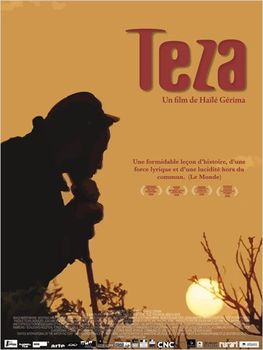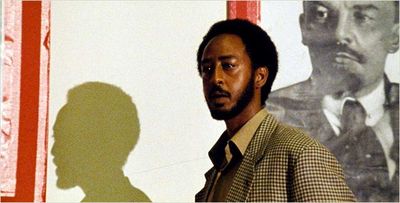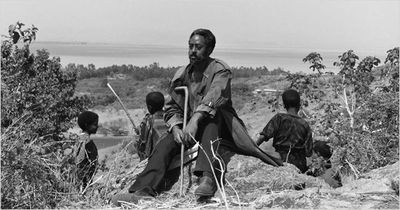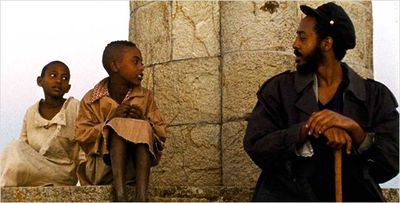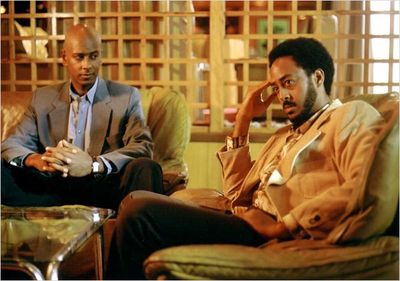It’s been a long time since an African film has to this extent drawn us into the epic. In this sense, Haile Gerima renews with his magnificent Harvest: 3000 Years (Mirt Sost Shi Amit), which in 1976 audaciously proffered an unforgettable visual poem that already drew a parallel between the future of the peasantry and of Ethiopia. The opening of Teza is stunning: a puzzle punctuated with chants, a storm, fire, traditional illuminations, veils, memories of childhood, of an accident, all of which are woven together by a fluidly moving camera and powerful music. The entire film is already there, but we don’t yet know it: cultural roots, childhood, memory, trauma, exorcism… The flames of the fire are intense: Anberber finally returns to the village to see his mother. He limps and his leg is ridden with accumulated pains, those of a suffering people, torn by political factions that hunt down and capture its children to enlist them. Anberber is a ravaged Ethiopia, but also a disillusioned Gerima seeking a path of hope despite the vicissitudes of the past.
The attempt at historic introspection is on a par with the extent of the traumatism. It takes on the air of a confession, the register being so much one of repentance. This country followed false prophets; this generation made politics a religion. Anberber believed he could serve the revolution; he only reaped frustrations and repression. Violence as the language of the State finds its echo in Europe, in the racism which builds up against Anberber. For this film is dedicated both to all black people killed because they were black, and to all Ethiopians killed by Ethiopia.
With the exception of a few respirations, the image – very powerful in the Ethiopian sequences, while the German sequences suffer from the hazards of a late and under-funded shoot – is always in movement, to the point of panning before the frame is established so as to heighten the tension. The tight montage randomly juxtaposes the different eras to highlight both Anberber’s interior turmoil and the country’s degeneration. Passionate about his culture, Gerima portrays it with enthusiasm, just as he abundantly uses the beauty of Ethiopia’s landscapes. Yet he never lapses into prettified images; the montage is there to keep the spectator alert, forced to piece together the puzzle and seek its meaning.
In his student days in Germany, Anberber becomes politicized. Negus Halie Selassie’s fall rekindles the hope of returning to serve the native land. The revolution will separate mixed couples, fathers from their children. His friend, Tesfaye, leaves his son Teodros behind him, who will also be subjected to racism and later dream of re-uniting with his African heritage.
The authoritarian bent of Mengistu’s regime quickly proves itself to be tragic. Death lies in wait for any form of deviation. And yet it is this very marginality that guides Anberber’s whole trajectory, from the moment his girlfriend Cassandra’s radicalism opens his eyes. In the village, he remarries Azanu, ostracized for having killed her own child when her husband took a new wife. He finds himself loving she who has killed, thereby in this respect also marrying the History of his country. He belongs to the village, but he is not from their clan, within their norms: his quest for memory gives him another vision of men and History. Traumatized as much by the racist attack as the murder of children or of his friends, he lives the ensuing doubt in his flesh. It will take ice-cold water and rituals, agreed to out of respect for his mother, to rid him of his demons and to enable him to mount his bicycle to teach the youth. These children who hide away in the cave to escape being kidnapped and death are the new generation, that which still has a firm enough footing to define a future. It is there too that the child he could not have with Cassandra will be born. It is in the belly of the earth and women that tomorrow’s men will be born if those of yesterday succeed in exorcising the errors of the past. This prophetic message, which is both political and Christian, concludes this spiralling film. Gerima does not spare the West, which is only seen from the angle of racist violence, any more than he does his generation for not managing to avoid authoritarian deviances. With an undeniable verve, he asserts that even though he is exiled in the United States, it is his childhood and his cultural roots that structure him. And that there is repentance to be done vis-à-vis history to open the pathway to the future. This message, driven home throughout the film through Anberber’s commentary, then by the elder’s interpretation of his dream, nonetheless also seems to come round full circle: will History’s exorcism suffice for those who come out of the cave to be able to forge new horizons? Or, for want of re-thinking their being in the world in its globality rather than through prophetism, won’t they be condemned to make of the revolution that they define for themselves a stuttering of that from which they want to free themselves?
///Article N° : 10862
